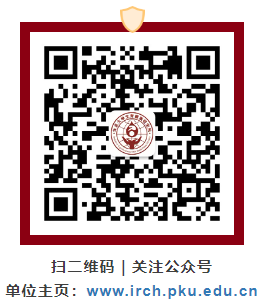
Featured research
Prof. Jufen Liu's team published a paper in Social Science & Medicine revealing effects of hearing impairment of spouse on cognitive health among old married couples

Introduction
With rapidly ageing in China, the increasing prevalence and burden of mild cognitive impairment, and dementia make cognitive health a major public health concern. It is of critical importance to identify potential risk factors for cognitive impairment that can serve as intervention targets for prevention programs. Recent evidence has demonstrated that hearing impairment may exacerbate risks of cognitive impairment and dementia, hence hearing impairment has been identified as a key modifiable risk factor for cognitive impairment. Although studied revealed that an individual's hearing impairment may have negative spillover effects on the psychosocial and relational well-being of couples, past investigation of connections between hearing impairment and cognitive function within married couples has been limited. Given current challenges in treating or managing cognitive decline and dementia, ascertaining risk factors for cognitive decline related to hearing impairment in families may provide new intervention targets for preventing cognitive decline. Therefore, our study examined the association between hearing impairment and cognitive function among middle-aged and older married couples in China.
Article: Original research
First Affiliation: Peking University
First author: Yushan Du
Corresponding author: Jufen Liu
Journal: Social Science & Medicine, IF2023 = 5.4
Citation: Du Y, Luo Y, Ren Z, Zheng X, Liu J*. What impact does hearing impairment have on cognitive health in older married couples in China?. Social Science & Medicine, 2024 May: 116999. doi: 10.1016/j.socscimed.2024.116999.
Full Text Links: https://www.sciencedirect.com/science/article/pii/S027795362400443X
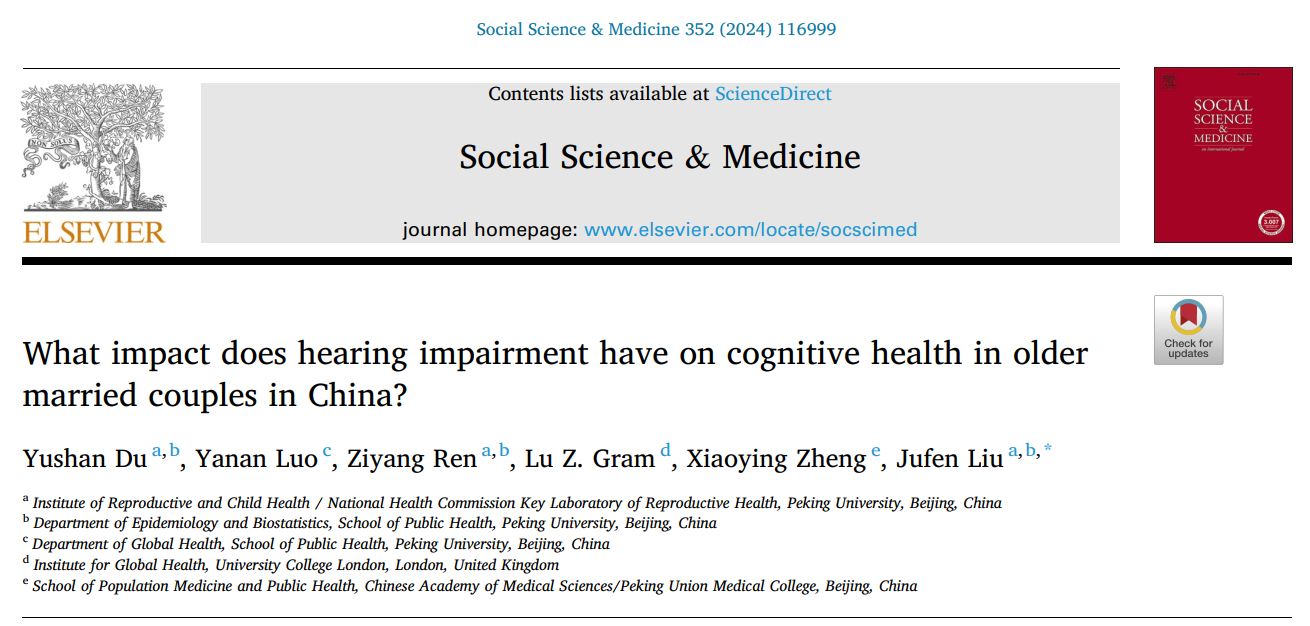
Abstract
Hearing impairment is a common geriatric health problem and chronic stressor, and it is associated with poor cognitive outcomes. However, little is known about the impact of hearing impairment in married couples, particularly its potential spillover effects on the cognitive health among spouses of individuals with impairment. Drawing on a stress-proliferation perspective, we used actor-partner interdependence models to examine (1) whether an individual's hearing impairment influences their spouse's cognitive function; and (2) whether AL, symptoms of depression, and social participation serve as mediators for such an association. We utilized data from the 2015 (baseline) and 2018 (3-year follow-up) waves of the China Health and Retirement Longitudinal Study. 4434 couples were included at baseline, and 2190 couples remained after the 3-year follow-up. Hearing impairment among married women was associated with negative impacts on their spouses' cognitive function. Symptoms of depression and social participation may have served as potential mediators in this relationship. For married men, there was no statistically significant association between hearing impairment and spouses' cognitive function. Our findings suggest that hearing impairment among one spouse can lead to negative impacts on the other, but that this effect may depend on gender. Early diagnosis and couple-based interventions for hearing impairment are important for the cognitive health of both hearing-impaired individuals and their spouses.
Keywords: Cognitive function; Hearing impairment; Spouses; Stress proliferation.
Dr Jufen Liu and her colleagues from School of Public Health, Peking University use China Health and Retirement Longitudinal Study (CHRLS) to explore whether an individual's hearing impairment influences their spouse's cognitive function; and whether allostatic load, symptoms of depression, and social participation serve as mediators for such an association. The study has been recently published in Social Science & Medicine.
The study utilizes data from the 2015 (Wave 3) as our survey ‘baseline’ and 2018 (Wave 4) as its ‘three-year follow-up’ wave of CHARLS. 4516 couples (9032 individuals) were included at baseline, and 2190 couples (4380 individuals) were included after the 3-year follow-up. In the main analyses, an actor–partner interdependence model (APIM) was used to estimate the association between hearing impairment and cognitive function within married couples. Results showed that significant partner effect was found for the association between wives' hearing impairment and husbands' worse cognitive function, while husbands' hearing impairment exhibited no significant partner effect. In contrast,
At the baseline, both husbands and wives who had spouses with hearing impairment were more likely to have worse cognitive function compared to those whose spouses did not have hearing impairment (P < 0.001). After the 3-year follow-up, significant differences were observed in both husbands' and wives' cognitive function among dyads with pre-existing hearing impairment, dyads with recent-onset hearing impairment, and dyads without hearing impairment.
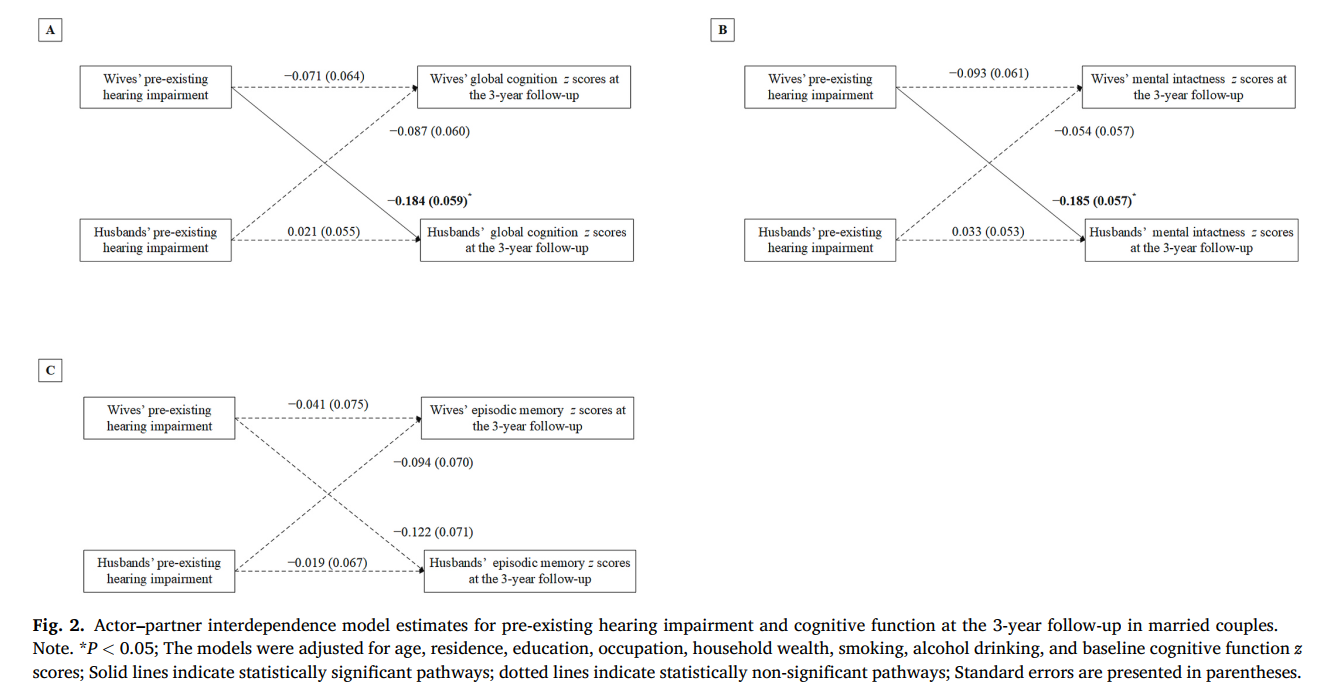
The APIM estimates of actor and partner effects for the association between hearing impairment and cognition function three years later showed that the longitudinal effects of pre-existing hearing impairment on cognitive function three years later are displayed in Fig. 2. After adjusting for all the covariates, wives' pre-existing hearing impairment was negatively associated with their husbands' global cognition z scores three years later (β = −0.184, 95%CI: −0.299, −0.069). The same negative associations were found between wives' pre-existing hearing impairment and husbands' mental intactness z scores three years later. The partner effects for the association between wives' pre-existing and husbands' worse global cognition z scores three years later remained statistically significant among younger spouses (β = −0.221, 95%CI: −0.404, −0.039), and showed marginal significance among older spouses (β = −0.147, 95% CI: −0.308, 0.013, P = 0.072).
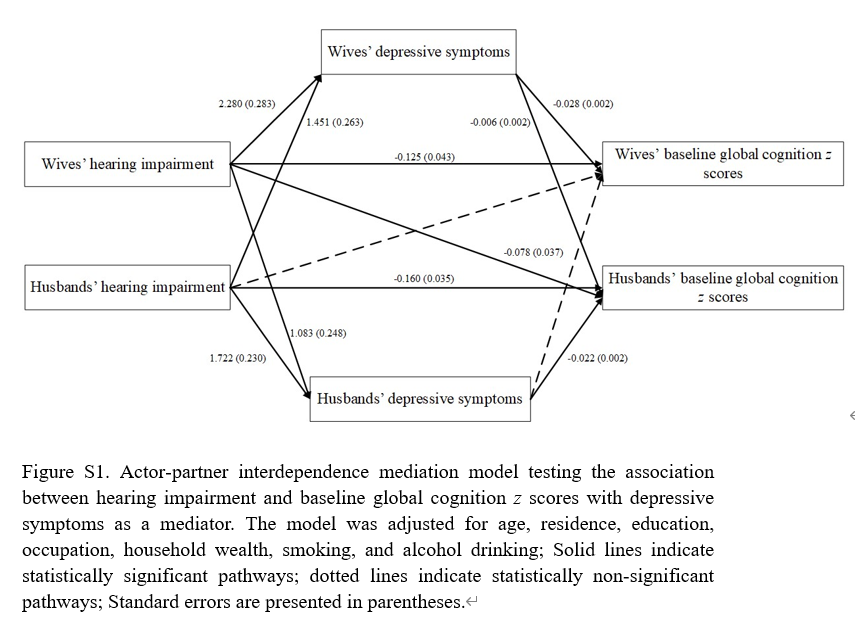
There was a significant indirect effect of married women's hearing impairment on their husbands' baseline global cognition z score through more symptoms of depression in either wives or husbands (β = −0.039, 95% CI: −0.053, −0.024). This accounted for 33.3% of the total effect of wives' hearing impairment on husbands' cognitive function. There was also a significant indirect effect of wives' hearing impairment on husbands' cognitive function mediated by decreases in either partner's social participation (β = −0.019, 95% CI: 0.031, −0.007), which accounted for 15.4% of the total effect. However, we only found significant indirect effects through decreased social participation of husbands (β = −0.016, 95% CI: −0.027, −0.004). We found no evidence for an indirect effect through changes in the social participation of women (β = −0.003, 95% CI: −0.008, 0.002). The results are visually presented in Figs. S1 and S2. The associations between pre-existing hearing impairment amongst wives and symptoms of depression amongst themselves or their husbands remained significant (Fig. S3).
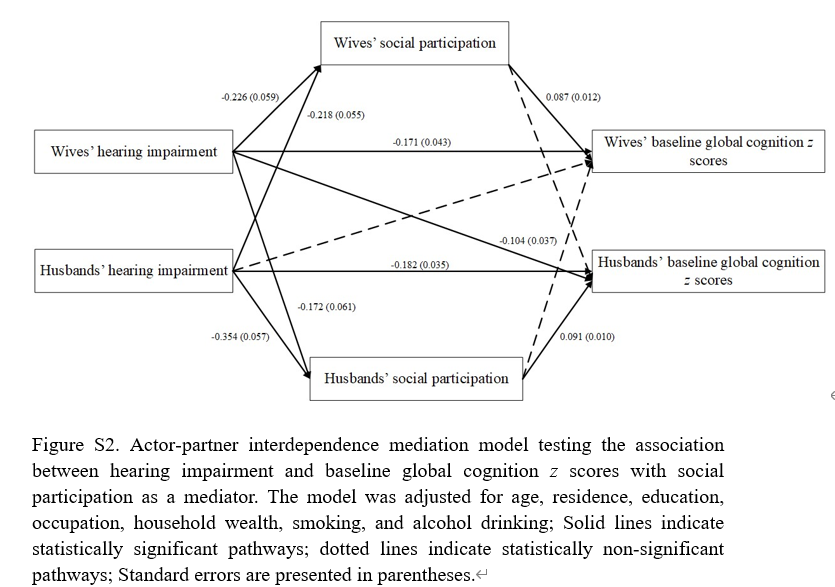
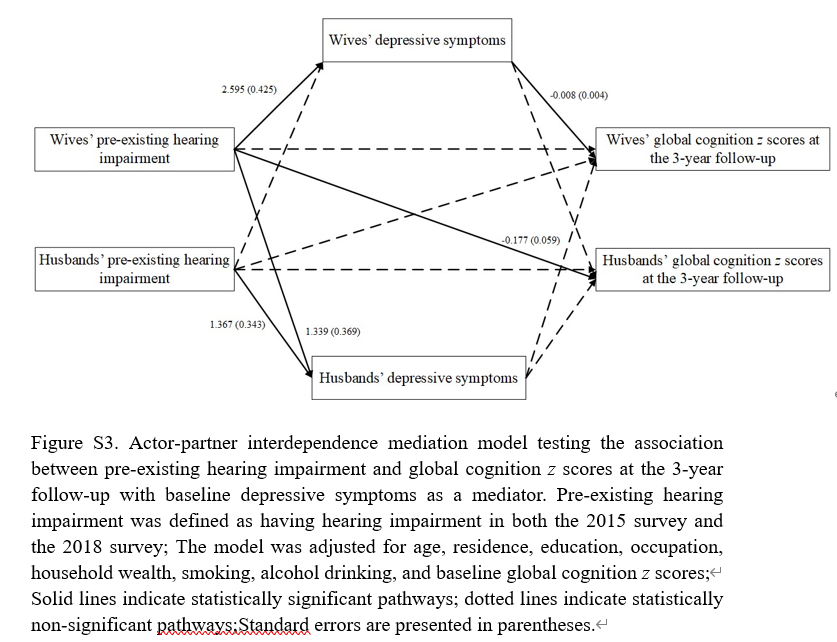
Summary and Outlook
The results from this study demonstrate a negative impact of married women's hearing impairment on their husbands' cognitive health, suggesting that the negative impact of hearing impairment can spill over from one spouse to the other. Our findings provide important evidence that increasing access to hearing services and developing couple-based hearing interventions may be effective strategies for preventing cognitive impairment. They provide impetus for the need to build comprehensive and integrated health care systems that can care for hearing and cognitive health at the same time.
Funding
This work was supported by the Major Project of the National Social Science Fund of China (grant number 21&ZD187, 21ZDA107), and China Scholarship Council (grant number 202206015010).
Acknowledgements
We are very grateful to the staff and participants of the China Health and Retirement Longitudinal Study. Additionally, we would like to extend our appreciation to the anonymous reviewers for their constructive comments, which significantly contributed to the improvement of our manuscript.
Author Biography
First author

Yushan Du, Master student of Public Health, Institute of Reproductive and Child Health, School of Public Health, Peking University.
Research Interests: Social epidemiology. To date, five papers have been published as the first author or co-first author in Journal of Affective Disorders (Impact Factor = 6.6), Nutrients (Impact Factor = 5.9), Child Abuse & Neglect (Impact Factor = 4.8), Nutrition Research (Impact Factor = 4.5), and the International Journal of Environmental Health Research (Impact Factor = 3.2). She received the Peking University Outstanding Research Award for the 2022-2023 academic year.
Corresponding author

Dr. Jufen Liu, Assistant professor (Tenure Track), Institute of Reproductive and Child Health, School of Public Health, Peking University.
Dr. Jufen Liu lead her research to investigate the early life determinants and trajectories of chronic diseases throughout the life course, through which to develop population level interventions to prevent chronic diseases and multimorbidity, as well as to support translation of discovery into policy and practice both within in China and in the global community. She has a broad interest in birth defects and disability, focusing on neurodevelopmental disorders, degenerative diseases, chronic diseases and multi-morbidities at all ages. She has led on original research articles and her publications are featured in journals such as International Journal of Epidemiology, eClinicalMedicine, Social Science and Medicine, Globalization and Health, General Psychiatry, Chinese Journal of Epidemiology, Chinese Journal of Preventive Medicine, and so forth. Her research has been recognized with awards from Huaxia Medical Science and Technology Assiociation, Chinese Preventive Medicine Association, Beijing Preventive Medicine Association and Ministry of Education, China. Dr Liu served as scientific communities, she is a standing committee member of the China Maternal and Child Health Association's Professional Committee on Perinatology and Metabolism; a member of the Chinese Preventive Medicine Association's Professional Committee on Birth Defects Prevention and Control, and the Committee on Family-School-Community Education of the Chinese Family Education Society. She is also served in the editorial boards of academic journals, including Reproductive Health (Deputy Editor), BMC Pregnancy and Childbirth (Editorial Board Member), China CDC Weekly (Guest Editor), Frontiers in Nutrition (Guest Editor), Nutrients (Guest Editor), and China Journal of Reproductive Health (Editor).
Dr. Yanan Luo, from School of Public Health, Peking University; Dr. Lu Z. Gram, from Institute for Global Health, University College London and Prof. Xiaoying Zheng, from School of Population Medicine and Public Health, Chinese Academy of Medical Sciences/Peking Union Medical College made significant contribution to this study.
Contributed by | Dr. Jufen Liu and her research team (Peking University)
Reviewed by | ExposomeX Team
Institute Introduction

Peking University Institute of Reproductive and Child Health
Peking University Institute of Reproductive and Child Health mainly focus on the research areas of reproductive health epidemiology, environment and reproductive health, and translational research in reproductive health studies. It particularly focuses on the distribution patterns, influencing factors, mechanisms of disease, and prevention strategies for adverse reproductive health outcomes, utilization of big data in reproductive health, application of artificial intelligence, and related interdisciplinary transformations. The institute serves as the direct support unit for the NHC Key Laboratory of Reproductive Health (Peking University) and is specifically responsible for the National Office for Maternal and Child Health Annual Report. Its achievements have been published in top international journals with the faculties as the first or corresponding authors, such as NEJM, Lancet, JAMA, BMJ, Cell, PNAS, Science Bulletin, JAMA subsidiaries, Lancet subsidiaries, Science subsidiaries, Nature subsidiaries, The Innovation, Environ Health Perspect, Int J Epidemiol, Environ Sci Technol, etc. It also hosts the core Chinese scientific journal "Chinese Journal of Reproductive Health" (Website: http://cjrh.bjmu.edu.cn/).
The outstanding talents at home and abroad are welcome for seeking job and build dream here. Contacts: Dr. Bin Wang, Vice Dean of Institute of Reproductive and Child Health of Peking University. Main page: https://sph.pku.edu.cn/info/1442/4225.htm
